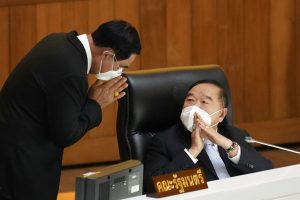Thailand’s Constitutional Court ruled Friday that Prime Minister Prayut Chan-o-cha can remain in his job and did not violate a constitutional provision limiting him to eight years in office.
Opposition lawmakers had petitioned the court to decide on their contention that Prayut, who took power as army commander after a 2014 coup, has violated the eight-year limit for prime ministers that was included for the first time in Thailand’s 2017 Constitution.
Prayut officially became prime minister in a military government in August 2014, and was named prime minister again after a 2019 election. Using 2014 as a starting date, he would have reached his legal limit last month.
He and his supporters argued that the countdown for the term limit should begin when the current constitution came into effect in April 2017, which would allow him to serve until 2025 if he is returned to office after the next general election.
The nine-member court said in a majority opinion that because the constitution came into effect after Prayut had already taken power, the term limit did not apply to the time he had previously served, since the constitution did not specify it could be applied retroactively.
Prayut still will face a political reckoning early next year when Parliament’s four-year term expires and a new election must be called. His popularity ratings are low, with critics saying he has mishandled the economy and botched Thailand’s initial response to the COVID-19 pandemic.
In 2020, tens of thousands of people took to the streets to demand that Prayut and his Cabinet resign, while also calling for the constitution to be amended and the monarchy to be reformed. Several confrontations between the student-driven protest movement and authorities became violent. Activists have threatened new protests if the court favored Prayut, raising fears of more unrest.
Last month, the Constitutional Court temporarily suspended Prayut from carrying out the prime minister’s duties pending its ruling. The senior deputy prime minister in his Cabinet, Prawit Wongsuwan, became acting prime minister, while Prayut retained his concurrent position of defense minister.
Had Prayut been forced out Friday, power would have been ceded to a caretaker government with limited executive powers, assembled from the current Cabinet, that would have sat until Parliament elected a new prime minister.
The eight-year term limit was meant to target former Prime Minister Thaksin Shinawatra, a populist billionaire who was ousted by a 2006 military coup but whose political machine remains powerful. The army in 2014 also ousted the government of Thaksin’s sister, Yingluck Shinawatra, who was forced from office shortly before the takeover by a controversial court decision.
Thailand’s traditional conservative ruling class, including the military, felt that Thaksin’s popularity posed a threat to the country’s monarchy as well as their own influence. The courts have been stalwart defenders of the established order and ruled consistently against Thaksin and other challengers.

































